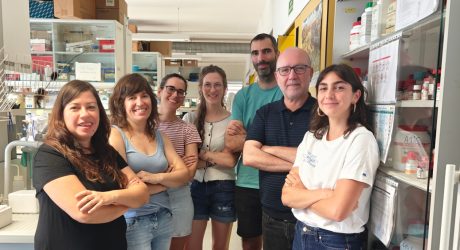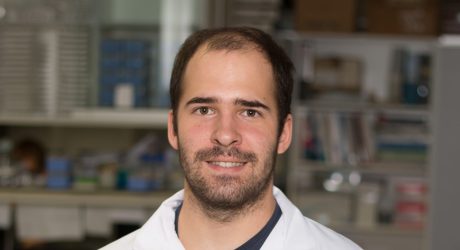IDIBGI among the twenty-nine entities that collaborate in SOPHIA project that seeks to improve obesity treatment
This international public-private research project has been supported by the European Union.
Girona Biomedical Research Institute (IDIBGI) has joined forces with twenty-eight other partners including industry, universities, research institutes and civil society to better understand obesity and optimise future treatment. The consortium will carry out the SOPHIA (Stratification of Obese Phenotypes to Optimize Future Obesity Therapy) project, which aims to characterise and stratify clinically-meaningful subpopulations of patients living with obesity to match the right treatment for the right person at the right time.
At IDIBGI, the Project will be leaded by Dr. José Manuel Fernández-Real, group leader of the research group Nutrition, Eumetabolism and Health and CIBEROBN investigator (Instituto de Salud Carlos III). Dr. Josep Puig from the same institute, Dr. Rafel Ramos (IDIBGI and IDIAP Jordi Gol) and Dr. Gema Frühbeck (Universidad de Navarra-Clínica Universidad de Navarra) will also collaborate in the project.
Obesity is a global pandemic currently affecting around 150 million people in Europe and 650 million people worldwide. Obesity complications are common but we cannot yet predict who will develop any of the 200 known complications of obesity. Moreover, there are insufficient predictors for who will respond to obesity treatments. SOPHIA will identify, characterise and stratify clinically-meaningful subpopulations of patients living with obesity to match the right treatment for the right person at the right time. SOPHIA will provide evidence-based classification of predictors for obesity complications and response to obesity treatment while also identifying and charting models for sustainably developing treatment pathways that will be valuable for patients, healthcare systems, researchers and clinicians. SOPHIA will also investigate health outcomes in people with obesity who have type 1 diabetes.
The voices of people living with obesity will be at the heart of SOPHIA through the establishment of a Patient Advisory Board. It will ensure that patients’ insights, opinions and wishes are placed at the core of SOPHIA and interwoven into the multiple layers of the study. The research group will use its findings to contribute to a more patient-centric and equitable narrative around obesity and its multiple impacts on individuals from both a social and medical perspective. It all starts with obesity being a chronic disease, not something people choose to live with. SOPHIA has been granted €16 million in funding from the Innovative Medicines Initiative (IMI) – a joint undertaking of the European Commission and the European Federation of Pharmaceutical Industries and Associations (EFPIA); JDRF (formerly the Juvenile Diabetes Research Foundation); the Obesity Action Coalition; and T1D Exchange.
The project kicked off its activities across Europe on 1 June 2020. It will last until 31 May 2025 and the first milestone is planned for September 2020.
Our mission within SOPHIA is to enable healthcare professionals to reliably predict the complications of obesity and who will respond to treatment
Prof. Carel le Roux, coordinator of SOPHIA and obesity physician at the Diabetes Complications Research Centre at University College Dublin
Obesity is a complex, chronic disease and there is still a lot we do not know, both about the biology of the disease itself and how treatment can improve the lives of patients with obesity. SOPHIA is an important step towards understanding obesity better. The collaboration between academia, industry and associations promises strong and unique results
Dr Marianne Ølholm Larsen Grønning of Novo Nordisk, SOPHIA Project Leader

With the statistical power afforded by such a large European collaboration, we will be able to investigate the two-way relationship between obesity and type 1 diabetes and ultimately be able to make valid predictions about health outcomes in this traditionally underappreciated population. Since recent epidemiological data indicate that nearly half of adults with T1D in some European countries have overweight or obesity, it is critical for the T1D community to address this challenge
Dr Sanjoy Dutta, JDRF Vice President of Research
Project facts
Project acronym: SOPHIA
Start date: 01 June 2020
Duration: 60 months
Budget: € 16 Mio
Coordination: University College Dublin, Prof Carel le Roux
Project Lead: Novo Nordisk A/S, Dr Marianne Ølholm Larsen Grønning
- Some of the methods used in SOPHIA will be:
- Creating a database
- Conducting analysis
- Conducting in-depth qualitative methods with patients to identify their perceptions and perspectives on obesity diagnosis and treatment
- Finding a shared value with all stakeholders to ensure better treatment of people living with obesity
SOPHIA partners at a glance
| Belgium | Third-I bvba Katholieke Universiteit Leuven |
| Denmark | Novo Nordisk A/S |
| France | Centre Hospitalier Universitaire de Lille |
| Germany | University of Ulm Lipotype University Hospital Tübingen Metabolon Boehringer Ingelheim Pharma GmbH & Co KG |
| Ireland | University College Dublin University College Cork AtturosThe European Association For the Study of Obesity – Ireland Company Limited By Guarantee |
| Italy | Università Cattolica del Sacro Cuore Consiglio Nazionale delle Ricerche, Pisa |
| Netherlands | Erasmus Medisch Centrum Maastricht University |
| Spain | Girona Biomedical Research Institute (IDIBGI) |
| Switzerland | Medtronic International Trading Sarl SIB Swiss Institute of Bioinformatics |
| Sweden | Lund University University of Gothenburg |
| United Kingdom | University of DundeeUniversity of Exeter |
| United States | Eli Lilly and Company George Washington University JDRF International T1D Exchange Obesity Action Coalition |
About IMI
The Innovative Medicines Initiative (IMI) is Europe’s largest public-private initiative aiming to improve health by speeding up the development of, and patient access to, innovative medicines, particularly in areas where there is an unmet medical or social need. IMI facilitates collaboration between the key players involved in healthcare research, including universities, the pharmaceutical and other industries, small and medium-sized enterprises (SMEs), patient organisations, and medicines regulators. It is a partnership between the European Union (represented by the European Commission) and the European pharmaceutical industry (represented by EFPIA, the European Federation of Pharmaceutical Industries and Associations). For further information: www.imi.europa.eu
This project has received funding from the Innovative Medicines Initiative 2 Joint Undertaking (JU) under grant agreement No 875534. The JU receives support from the European Union’s Horizon 2020 research and innovation programme and EFPIA and T1D Exchange, JDRF, and Obesity Action Coalition.




